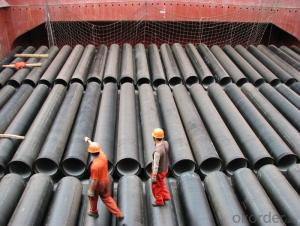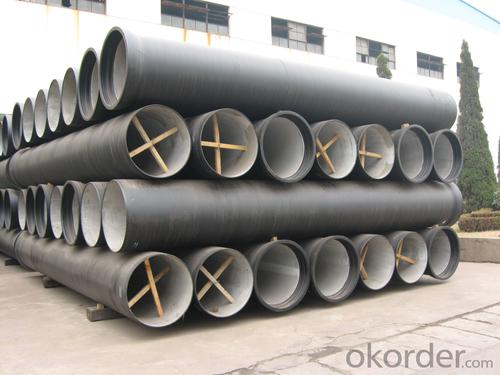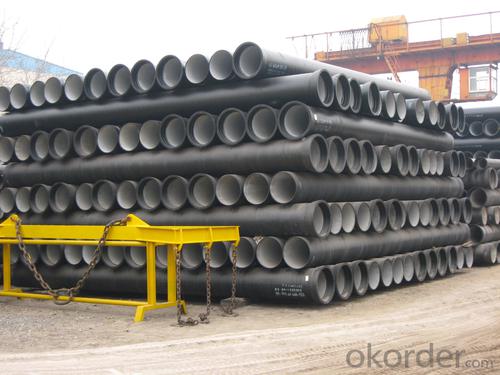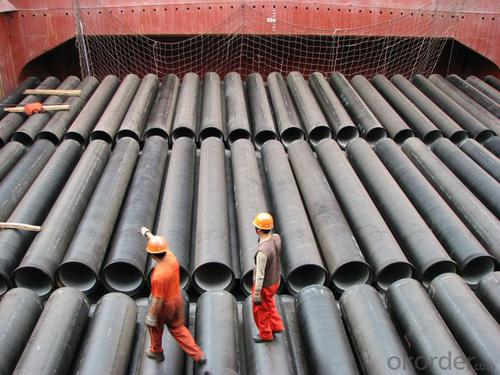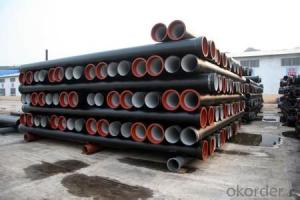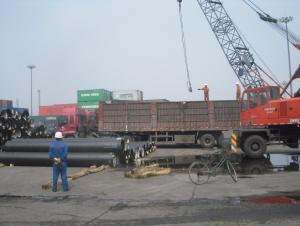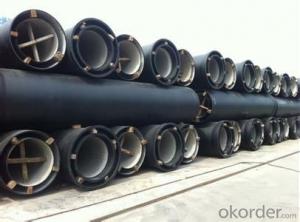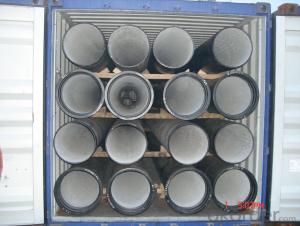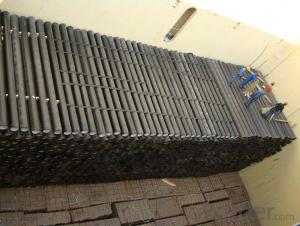DUCTILE IRON PIPE DN400 K8
- Loading Port:
- China Main Port
- Payment Terms:
- TT OR LC
- Min Order Qty:
- -
- Supply Capability:
- -
OKorder Service Pledge
OKorder Financial Service
You Might Also Like
Specification:
1) The standard of pipe: ISO2531:1998, K9
2) Effective length: 6m
3) Inner cement line: Portland cement line as per ISO4179
4) Zinc coating: at least 130g/m2 as per ISO8179
5) Bitumen painting: at least 70um as per ISO8179
6) With 100% quantity of NBR ring, or SBR ring, or EPDM ring as per ISO4633
7) DN80mm-800mm
8) High strength, lighter than grey iron, good corrosion resistance, no furring, small flow resistance, easy fixing, long life tome about 100 yeas
9) Produced by Hangzhou chunfeng machine
10) Checked by automatic inspection equipment
11) Composition:
Chemical composition | | | | |||
Chemical composition | Ductile Cast Iron Pipe (%) | Grey iron pipe (%) | Steel pipe (%) | | | |
C | 3.5-4.0 | 3.2-3.8 | 0.1-0.2 | | | |
Si | 1.9-2.6 | 1.4-2.2 | 0.15-0.4 | | | |
Mn | 0.15-0.45 | 0.4-0.6 | 0.3-0.6 | | | |
P | ≤0.06 | ≤0.3 | 0.02-0.03 | | | |
S | ≤0.02 | ≤0.1 | 0.02-0.03 | | | |
Mg | 0.03-0.06 |
|
| | | |
12) Feature:
Mechanical properties | | | | |||
| Ductile Cast Iron Pipe | Grey Iron Pipe | Steel Pipe | | | |
Tensile Strength(Mpa) | ≥420 | 150-260 | ≥400 | | | |
Yield Strength(Mpa) | ≥300 | No Confirmation | No Confirmation | | | |
Bending Strength(Mpa) | ≥590 | 200-360 | ≥400 | | | |
Elongation (%) | ≥10 | Neglected | ≥18 | | | |
Brinell Hardness(HBS) | ≤230 | ≤230 | About 140 | | | |
13) T type mechanical joint
14) Packing: in bulk or container
- Q: How does ductile iron pipe perform in areas with high soil acidity?
- Ductile iron pipe performs well in areas with high soil acidity due to its inherent corrosion resistance properties. The pipe is designed to withstand harsh environments and has a protective lining that prevents the acidic soil from causing damage. This lining acts as a barrier between the pipe and the soil, preventing the acid from corroding the iron. Additionally, ductile iron pipe has a high resistance to external loads, making it suitable for areas with unstable soil conditions. Overall, ductile iron pipe is a reliable choice for areas with high soil acidity as it can withstand the corrosive effects and provide long-lasting performance.
- Q: Can ductile iron pipes be used in areas with high levels of organic matter in soil?
- Yes, ductile iron pipes can be used in areas with high levels of organic matter in soil. Ductile iron pipes have excellent corrosion resistance, making them suitable for various soil conditions, including those with high levels of organic matter. They are resistant to chemical attacks and offer long-term durability, making them a reliable choice for such environments.
- Q: Can ductile iron pipes be used in sewage treatment plants?
- Yes, ductile iron pipes can be used in sewage treatment plants. Ductile iron pipes are a commonly used material in sewage systems due to their durability, strength, and corrosion resistance. They are able to withstand the harsh conditions often present in sewage treatment plants, such as corrosive wastewater and high-pressure environments. Ductile iron pipes are also highly resistant to cracking and provide long-term reliability, making them a suitable choice for sewage treatment plants where a reliable and efficient sewage system is crucial.
- Q: DN300 what's the price of the ductile iron pipe / the weight and the price of one meter?
- The annealed ductile iron pipe is composed of ferrite and pearlite. The mechanical properties of the ductile iron pipe are better.
- Q: The difference between spheroidal graphite cast iron pipe and HDPE water supply pipe
- HDPE pipe is made of hot melt butt joint, and the strength of interface is very good. Ductile iron pipes are made of socket joint, and reinforced concrete piers shall be rammed on three links, elbows and other parts. In this regard, the cost of natural selection of ductile iron pipe, HDPE pipe than the choice of high.
- Q: Why does the cast iron pipe always run off when testing?
- The pipeline is installed, straight section of each pipe will be added pier, concrete pipe, elbow, three links should also have concrete pier, specific installation method according to GB Atlas 03SS515, and the straight pipe to soil, pipeline interface will be exposed, easy to check.
- Q: How much is the working pressure of ductile iron pipe used in water supply pipe and how is MPa determined?
- Upstairs are positive solutions, but now outdoor buried water pipes are using steel wire mesh skeleton, plastic composite pipe instead of ductile iron pipeThe general pressure grades used for water supply pipes are 1.0MPa and 1.6Mpa
- Q: What are the advantages of using ductile iron pipe?
- There are several advantages of using ductile iron pipe in various applications. Firstly, ductile iron pipe is known for its exceptional strength and durability. It has a higher tensile strength and yield strength than other types of pipes, making it resistant to cracking, bending, and breaking. This strength allows it to withstand high-pressure and heavy-load conditions, making it ideal for applications such as water and sewage systems, oil and gas pipelines, and industrial piping. Secondly, ductile iron pipe has excellent corrosion resistance. It is coated with a protective layer, usually zinc or epoxy, which prevents rusting and corrosion. This coating ensures a longer lifespan for the pipe, even in harsh environments or when transporting corrosive fluids. Another advantage of ductile iron pipe is its flexibility. Unlike rigid pipes, ductile iron pipes have a certain degree of flexibility, allowing them to withstand ground movement and settle without breaking. This flexibility is particularly beneficial in areas prone to earthquakes or soil settlements. Additionally, ductile iron pipe has a smooth inner surface, which helps to minimize flow resistance and improve the efficiency of fluid transportation. It also reduces the likelihood of sediment buildup or corrosion on the pipe's interior, resulting in improved flow rates and reduced maintenance. Furthermore, ductile iron pipe is cost-effective in the long run. Although it may have a higher initial cost compared to other types of pipes, its durability and low maintenance requirements make it a more cost-effective choice over time. The extended lifespan of ductile iron pipe reduces the need for frequent replacements and repairs, resulting in lower overall life-cycle costs. Lastly, ductile iron pipe is environmentally friendly. It is made from recycled materials, and its long lifespan reduces the need for frequent replacements, thus reducing the carbon footprint associated with manufacturing and transportation. In conclusion, the advantages of using ductile iron pipe include its exceptional strength, corrosion resistance, flexibility, smooth inner surface, cost-effectiveness, and environmental friendliness. These qualities make it a reliable and preferred choice for a wide range of applications in various industries.
- Q: Can ductile iron pipes be used in dam or reservoir projects?
- Yes, ductile iron pipes can be used in dam or reservoir projects. Ductile iron pipes are known for their strength, durability, and corrosion resistance, making them suitable for various applications, including water distribution and transmission systems. In dam or reservoir projects, where the pipes need to withstand high pressure and carry large volumes of water, ductile iron pipes are often preferred. They have excellent mechanical properties, including high tensile strength and impact resistance, which ensure their ability to handle the load and provide a reliable and long-lasting solution. Additionally, ductile iron pipes are also adaptable to various installation methods, including trenchless techniques, making them a versatile choice for dam or reservoir projects.
- Q: Can ductile iron pipe be used for wastewater treatment plant sludge dewatering?
- Yes, ductile iron pipe can be used for wastewater treatment plant sludge dewatering. Ductile iron pipe is known for its durability and corrosion resistance, making it suitable for applications in wastewater treatment plants. It can effectively handle the sludge dewatering process and provide reliable performance for long-term use.
Send your message to us
DUCTILE IRON PIPE DN400 K8
- Loading Port:
- China Main Port
- Payment Terms:
- TT OR LC
- Min Order Qty:
- -
- Supply Capability:
- -
OKorder Service Pledge
OKorder Financial Service
Similar products
Hot products
Hot Searches
Related keywords


